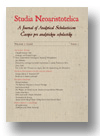
Studia Neoaristotelica-A Journal of Analytical Scholasticism
Scope & Guideline
Unraveling the Threads of Scholastic Tradition
Introduction
Aims and Scopes
- Analytical Examination of Scholasticism:
The journal emphasizes rigorous analytical approaches to Scholastic philosophy, particularly in the context of Aristotelian frameworks, aiming to clarify complex concepts and arguments. - Historical Contextualization:
Papers often explore historical figures and movements within the Scholastic tradition, examining their contributions and relevance to contemporary philosophical issues. - Interdisciplinary Engagement:
The journal encourages interdisciplinary dialogue, bridging philosophy with science, ethics, and gender studies, showcasing how classical thought informs modern discussions. - Focus on Moral and Ethical Philosophy:
A significant portion of the journal's publications addresses moral philosophy, examining theories of ethics and moral properties through the lens of historical figures. - Exploration of Metaphysical Themes:
The journal includes discussions on metaphysics, particularly in relation to concepts of being, essence, and existence, reflecting on their implications for contemporary philosophical discourse.
Trending and Emerging
- Integration of Modern Ethical Theories:
There is a growing trend towards integrating modern ethical theories with classical Scholastic thought, fostering a dialogue that enhances understanding of moral philosophy today. - Exploration of Science and Philosophy Interplay:
Recent papers increasingly explore the relationship between scientific developments and philosophical discourse, particularly how medieval nominalism and realism interact with contemporary scientific paradigms. - Focus on Female Philosophers and Perspectives:
Emerging themes highlight the contributions of female philosophers within the Aristotelian and Scholastic traditions, reflecting a broader interest in inclusivity and diverse perspectives in philosophical discussions. - Reinterpretation of Historical Texts:
The journal has seen a rise in papers that reinterpret classical texts in light of modern philosophical challenges, suggesting a dynamic approach to understanding historical works. - Application of Logic to Contemporary Issues:
An increasing number of articles apply logical frameworks from Scholasticism to address contemporary philosophical and ethical issues, illustrating the relevance of ancient logic in modern debates.
Declining or Waning
- Traditional Gender Roles in Scholasticism:
While gender studies are still relevant, discussions specifically about traditional roles of men and women in Scholastic thought have seen a decline, possibly as the focus shifts towards broader contemporary gender issues. - Classic Metaphysical Disputes:
There appears to be a waning interest in some classic metaphysical disputes that characterized earlier Scholastic debates, as contemporary papers lean towards applying historical insights to modern philosophical challenges. - Historical Figures' Biographies:
Papers that primarily focus on biographical accounts of historical figures from the Scholastic tradition are less common, indicating a shift towards more analytical and thematic examinations of their work rather than historical recounting.
Similar Journals

Acta Philosophica
Navigating the Landscape of Philosophical ThoughtActa Philosophica is a prestigious academic journal dedicated to the exploration and analysis of philosophical thought. Published by Fabrizio Serra Editore in Italy, this journal serves as a vital platform for scholars, presenting rigorous research that contributes to the field of philosophy. With an ISSN of 1121-2179 and an E-ISSN of 1825-6562, Acta Philosophica is indexed in prestigious databases, enhancing its visibility and impact within the academic community. Active since 2011, this journal has emerged as a significant player in the discipline, currently positioned in the Q3 quartile for Philosophy in 2023 and ranked #557 among 806 journals in the Arts and Humanities category on Scopus, placing it in the 30th percentile. Researchers and students alike will find valuable insights within its pages, as it covers a broad spectrum of philosophical inquiries. Although not an open-access journal, its rich content makes it essential reading for anyone invested in advancing philosophical discourse.

REVUE INTERNATIONALE DE PHILOSOPHIE
Illuminating Diverse Philosophical PerspectivesREVUE INTERNATIONALE DE PHILOSOPHIE, published by REVUE INT PHILOSOPHIE, is a prestigious journal in the field of philosophy, based in Belgium. With an ISSN of 0048-8143 and an E-ISSN of 2033-0138, this journal has been a vital platform for philosophical discourse since its inception in 1983, successfully evolving through various phases until 2024. Despite currently being positioned in the Q4 category of Philosophy according to the 2023 rankings, it serves as an important venue for scholars and students alike, allowing for a diverse exploration of philosophical thought. Although it is not an Open Access publication, the journal fosters a rich environment for rigorous scholarly research and debate. By presenting articles that challenge and inspire, REVUE INTERNATIONALE DE PHILOSOPHIE ensures that it remains an essential resource for anyone engaged in philosophical inquiry.

Sophia
Cultivating Knowledge at the Intersection of Thought and TraditionSophia, a prestigious journal published by Springer, is a leading platform for the advancement of knowledge in the fields of Philosophy and Religious Studies. Established in 1962, this open-access journal has embraced a global perspective and invites scholarly contributions that explore complex philosophical questions and the intricacies of religious thought. With an impact factor that reflects its significance, Sophia ranks in the top quartiles of its categories on Scopus, specifically Q2 in Philosophy and Q1 in Religious Studies, showcasing its influence and reach within the academic community. With convenient open access options available since 2009, the journal ensures that research disseminates freely, promoting engagement among researchers, professionals, and students alike. Located in the Netherlands and connected to a reputable international network, Sophia remains committed to fostering intellectual dialogue and enriching the discourse surrounding philosophical and religious issues worldwide.

Teoria-Rivista di Filosofia
Connecting Philosophers Through Innovative IdeasTeoria-Rivista di Filosofia is a distinguished academic journal published by EDIZIONI ETS, based in Pisa, Italy. With a focus on philosophical discourse, this journal is a valuable resource for researchers, professionals, and students in the field of philosophy. Having achieved a commendable Q3 ranking in the 2023 category quartiles, Teoria stands out in the competitive landscape of philosophy journals, with a Scopus rank of #612 out of 806, placing it in the 24th percentile. Although currently classified as a non-open access publication, it frequently addresses cutting-edge themes and challenges within philosophical research, promoting rigorous analysis and diverse perspectives. The journal spans various topics across multiple issues from its inception in 2011 to its ongoing publications scheduled through 2024, making it a relevant venue for contemporary philosophical inquiry. The journal aims to foster scholarly communication and stimulate critical debates, contributing significantly to the global philosophical landscape.
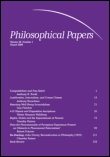
Philosophical Papers
Championing Rigorous Scholarship in PhilosophyPhilosophical Papers, an esteemed journal published by Routledge Journals, Taylor & Francis Ltd, stands as a pivotal resource in the field of philosophy. Having established its presence since 1972, this journal has converged a wealth of intellectual discourse and contributes to the continuous development of philosophical thought until 2024. With a prestigious Q1 category ranking in the arts and humanities, and a notable 86th percentile ranking in Scopus's philosophy category, it underscores its commitment to rigorous scholarship and influential research. Although Open Access options are not currently available, the journal remains a vital platform for philosophers, researchers, and students aiming to engage with pivotal philosophical debates and advancements. Set in the UK, Philosophical Papers exemplifies the intersection of tradition and innovation in philosophical inquiry, making it an indispensable reference for anyone dedicated to exploring the complexities of human thought and existence.
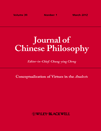
JOURNAL OF CHINESE PHILOSOPHY
Exploring the Depths of Chinese ThoughtThe Journal of Chinese Philosophy, published by Brill, stands as a pivotal platform for the exploration and dissemination of research within the realm of philosophy, particularly focusing on traditional and contemporary Chinese thought. With a commitment to academic excellence, this journal has earned a reputation for its rigorous scholarship, as reflected in its Q2 category ranking in the field of Philosophy on Scopus, currently positioned at rank #337 out of 806 in Arts and Humanities. Since its inception in 1973, the journal has consistently engaged scholars, professionals, and students alike, featuring articles that deepen understanding and provoke critical discourse among various philosophical traditions. Although it is not open access, the journal's influential contributions and comprehensive reviews of emerging trends in Chinese philosophy make it an essential resource for anyone engaged in the study of this rich and diverse field. For subscription and access details, interested readers can refer to the publisher's website.
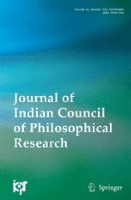
Journal of Indian Council of Philosophical Research
Promoting essential perspectives in philosophical research.The Journal of Indian Council of Philosophical Research, published by SPRINGER INDIA, serves as a vital platform for scholarly discourse in the realm of philosophy. With an ISSN of 0970-7794 and an E-ISSN of 2363-9962, this journal is committed to advancing philosophical inquiry and engaging with contemporary philosophical debates. Although it is currently categorized in the Q4 quartile for Philosophy and retains a position in the 28th percentile within its Scopus category rankings, the journal aims to uplift philosophical dialogue and promote innovative ideas through exclusive articles, reviews, and critical essays. Based in New Delhi, India, the journal operates within a vibrant academic context and spans converged years from 2015 to 2024. While it is not an open-access journal, it offers essential insights and perspectives that contribute significantly to the field of philosophy. Scholars and students alike will find this journal an invaluable resource for enriching their understanding and fostering intellectual growth in philosophical research.

Balkan Journal of Philosophy
Exploring the Depths of Balkan ThoughtBalkan Journal of Philosophy, published by ACAD PUBL HOUSE, stands as a significant contribution to the field of philosophy, particularly within the Balkan region. With an ISSN of 1313-888X and an E-ISSN of 2367-5438, this journal aims to advance philosophical discourse and scholarship from 2017 to 2024, making it a vital platform for emerging ideas and scholarly debates. Despite its emerging status, it holds a respectable Q3 quartile ranking and is positioned in the 22nd percentile for Arts and Humanities in Scopus, reflecting its growing impact in the academic community. Researchers and students alike can access vital philosophical studies that explore diverse themes and perspectives unique to the region. The journal not only fosters a broader understanding of philosophical thought but also encourages cross-cultural dialogues, making it an essential resource for anyone invested in philosophical inquiry.
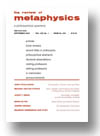
REVIEW OF METAPHYSICS
Advancing philosophical inquiry into the nature of reality.REVIEW OF METAPHYSICS is a distinguished journal published by PHILOSOPHY EDUCATION SOC, INC, dedicated to advancing scholarly discourse in the field of philosophy. With an ISSN of 0034-6632 and an E-ISSN of 2154-1302, this journal has been a crucial platform for philosophical inquiry since its inception in 1975, converging its rich content from 1992 and continuously serving the academic community up to 2022. Based in the United States, specifically at 223 Aquinas Hall, Catholic University America, Washington, DC, it has secured a reputation for quality, reflected in its placement within the Q3 category of the 2023 Philosophy rankings, and a Scopus rank of 367 out of 806 in Arts and Humanities, placing it in the 54th percentile. Although it does not offer open access options, the REVIEW OF METAPHYSICS remains an essential resource for philosophers and students alike, fostering critical perspectives on metaphysical issues, and thereby contributing significantly to the advancement of philosophical studies.
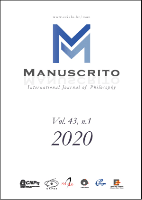
Manuscrito
Advancing Open Access to Transformative IdeasManuscrito is a prominent open access journal published by UNICAMP-UNIV ESTADUAL CAMPINAS, dedicated to exploring critical themes in the realm of Philosophy. With an ISSN of 0100-6045 and E-ISSN 2317-630X, it has been advancing academic discourse since its inception, transitioning to an open access model in 2011 to enhance the dissemination of knowledge. Strategically located in Campinas, Brazil, the journal's editorial focus spans a diverse array of philosophical inquiries, engaging scholars from various perspectives. The journal holds a respectable Q3 ranking in the 2023 category of Arts and Humanities - Philosophy in Scopus, ranking #503 out of 806 journals, placing it within the 37th percentile. The Manuscrito journal is committed to fostering intellectual exchange and encouraging research that challenges traditional paradigms. Researchers, professionals, and students will find it an invaluable resource for accessing pioneering ideas and contemporary philosophical debates, especially as it is poised to converge on new insights from 2017 to 2024.